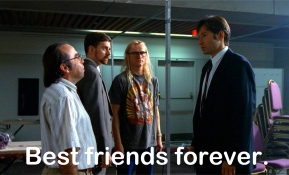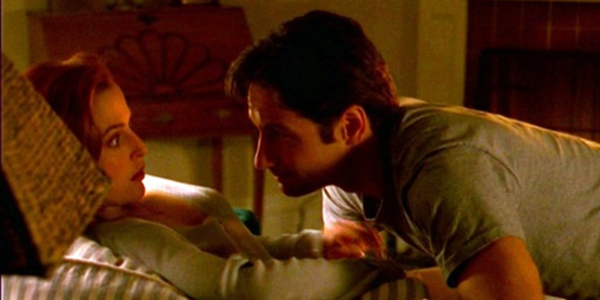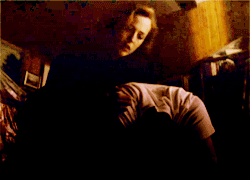MULDER: It’s open. (SCULLY enters with tray of cheese and mini bottle of wine.) Who cut the cheese?
SCULLY: Since you won’t be making it to the conference ….
MULDER: Partaaayyy!
SCULLY: However, I must remind you this goes against the Bureau’s policy of male and female agents consorting in the same motel room while on assignment. (opens wine)
You know – that policy we violated on our very first case together.
Season 5, Episode 4: “Detour”
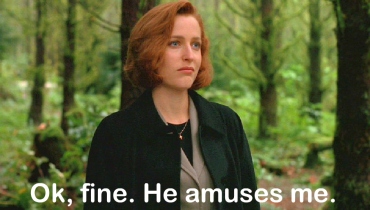
I’ve made no secret of my love for Star Trek on this blog, and I have a certain fondness for episodes I’ve come to call “Star Trek” episodes – ones in which Mulder and Scully face a strange phenomenon in an unfamiliar environment. These episodes mostly crop up in early seasons – think “Ice,” “Darkness Falls,” “Firewalker,” etc.
Some of these episodes are more successful than others, and this “Star Trek” formula was certainly an early season thing, almost dying out completely after Season 2. “Detour” is a welcome return to this formula, and is probably the best of this type of episode the series has to offer.
If you like “Darkness Falls,” you’ll go nuts over “Detour.” It’s got everything we like to see in a Mulder-and-Scully-go-to-the-woods kind of episode, on steroids: because this time, instead of casually mentioning the recent disasters that have occurred (such as the weak handling of Scully’s abduction in “Firewalker”), the struggle for survival becomes an integral part of the episode’s theme.
“Detour” also brings back something we haven’t seen in an unbearably long time: humor. (I’m not counting “Unusual Suspects.”) In “Detour” Mulder and Scully actually smile. They make jokes. They flirt. There’s cuddling. At the same time, there’s an intriguing mystery here and lots of running, chasing, shooting, and suspense. I can’t ask for more.
Like “Pusher,” “Detour” is another one of those episodes that’s almost difficult to discuss because its enjoyability really can’t be put into words and I’d much rather be watching it than talking about it. Still, what kind of reviewer would I be if I used that excuse to get out of discussing such a beloved, wonderful piece of television? A lame one, for sure.
One of the first things I noticed about “Detour” on my most recent rewatch is simply how comfortable the episode is. We’re at a point in The X-Files where everyone involved is secure in the writing, tone, and feel of the series. The days of finding its footing are long gone. This is unquestionably an episode of The X-Files and nothing else. I know that might sound strange to say seeing as we’re on the fifth season, but for a show with such a varied amount of topics and stories, tone is essential. There are probably dozens of television episodes in which people go investigate mysterious, red-eyed creatures in the woods, but only one is going to have two characters bond over “Joy to the World.”
Speaking of which,”Detour” gets a plethora of points for this exchange:
SCULLY: Mulder, you need to keep warm. Your body’s still in shock.
MULDER: I was told once that the best way to regenerate body heat was to crawl naked into a sleeping bag with some body else who’s already naked. (Snuggles closer.)
SCULLY: Well, maybe if it rains sleeping bags, you’ll get lucky.
(MULDER looks up at her.)
SCULLY: Have you thought seriously about dying?
MULDER: Yeah, once, when I was at the Ice Capades.
SCULLY: When I was fighting my cancer, I was angry at the injustice of it and its meaninglessness. And then I realized that that was the struggle – to give it meaning.
To make sense of it. It’s like life.MULDER: I think Nature is supremely indifferent to whether we live or die. I mean, if you’re lucky you get 75 years. If you’re really lucky you get 80 years. And if you’re extraordinarily lucky, you get to have 50 of those years with a decent head of hair.
SCULLY: (chuckle) I guess it’s like Las Vegas. The house always wins. (She breaks the bullet open.) Oh! Ta-da.
MULDER: Go, girl.
I only realized it on this rewatch, but that’s actually a very nice continuation of the characters’ struggles from “Redux II.” Scully’s still struggling with the meaning of life through spirituality. Mulder’s spiritual crisis has left him with a shaken sense of purpose. He’s become a bit nihilist since the events of “Redux II.” Mulder’s comment about Nature’s indifference is in my opinion not really reflective of Mulder’s general attitude throughout most of the series, except for this chunk of Season 5 where he’s a bit disillusioned. It’s very, very subtle, but it makes sense, don’t you think?
This whole scene, the famous “conversation on the log,” is just…well, to put it mildly, it’s perfect. From the writing to the delivery to the beautiful cinematography, you can put this on your list of favorite X-Files moments any day. It’s certainly on mine.
I especially love how the camera switches to a zoomed-out version of the same shot at the very end of the scene, putting Mulder and Scully in this almost larger, cosmic context. Okay, I’m probably reading too much into that. But it looks beautiful, doesn’t it?
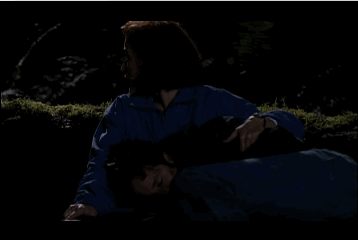
This is honestly one of those episodes I can’t think of a single flaw, problem, or nitpick. I mean, maybe I could if I thought really, really hard about it, but I don’t want to. Why would I? There’s no question: “Detour” is just a gem.

Final Score

Final score for “Detour” is 10/10. Joy to the world.
Notable Nuggets
- Like many before it, this entire episode is a notable nugget. I’m not even sure where to begin.
- Scully looks so disappointed when Mulder pulls yet another ditch on her wine and cheese partay. I can’t pretend I’m not a little mad at Mulder for that. Imagine the flirting!
- The amount of “Scullaaaaaay!” in this episode could warm even the staunchest Noromo’s heart.
- When Scully says “I’m not going to get tired,” you believe her.
- “I wouldn’t go far!” “Mulder, you never left my sight.”
- Although I do have to question Dr. Scientist Scully immediately consuming the first wild berry she sees. Hope she wasn’t sick on the car ride back.
